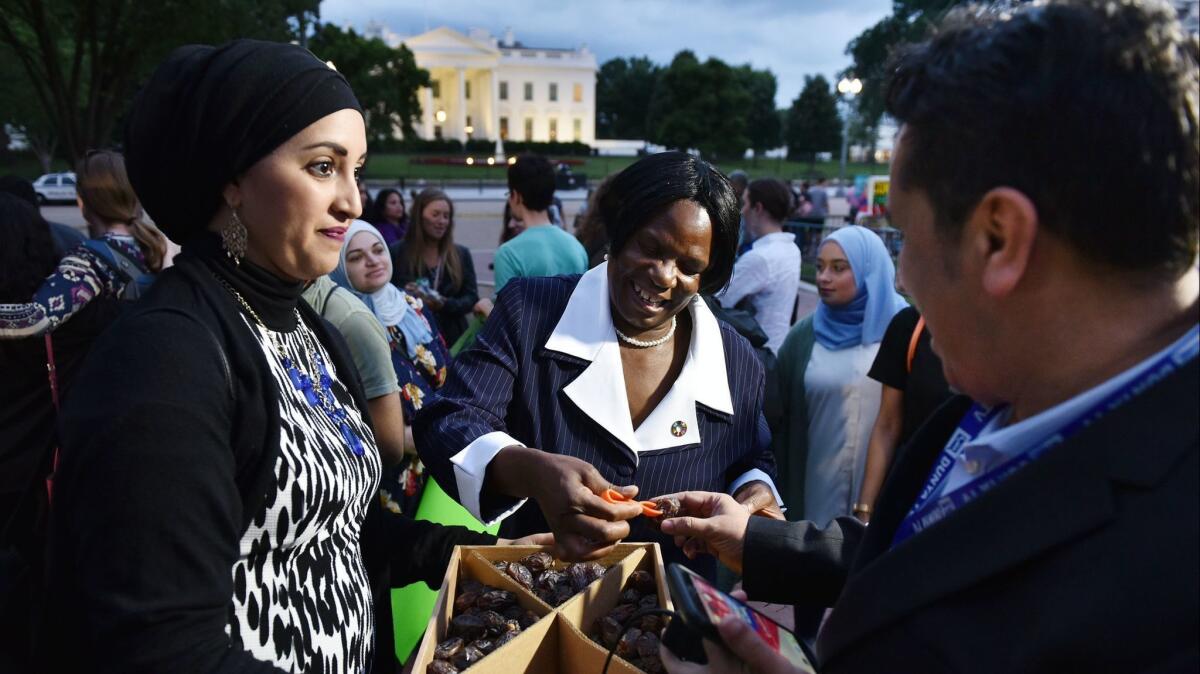Op-Ed: Islam is an American religion too, Mr. President

- Share via
Thursday night is Eid, when followers of Islam gather together with friends and neighbors to celebrate the end of Ramadan, a month of daily fasting.
Since 1996, when then-First Lady Hillary Clinton began the tradition, the White House has hosted an “iftar” — the daily fast-breaking dinner — during Ramadan. It has been a staple of both Republican and Democratic administrations, an opportunity to celebrate Ramadan with the American Muslim community, the leaders of its civic groups, its imams, its writers, artists and entertainers.
But not in the Trump administration. President Trump, whose animosity towards Islam and the Muslim community is well documented, didn’t host an iftar at all last year. This year, he honored the tradition with a dinner on June 6. But the representatives of American Muslim groups were not invited to the White House. Instead of community and religious leaders from across the United States, the guests included foreign ambassadors and dignitaries from Muslim-majority countries. It was as if the president hosted a White House Seder but with no American Jews invited.
Enter the Fray: First takes on the news of the minute from L.A. Times Opinion »
In his remarks at the dinner, Trump avoided Ramadan’s devotional message of reflection and sacrifice. He used the occasion to reminisce about his visit to Riyadh, Saudi Arabia, where he received a hero’s welcome and made deals that have fomented more enmity in the region, particularly between Iran and the Saudis.
The spectacle of the 2018 White House iftar gets to the heart of Trump’s view of Islam. He sees it as a foreign religion. He isn’t alone in this — other presidents have sought out foreign Muslims with more enthusiasm than homegrown ones. But Trump’s antipathy stands out. To him Islam is un-American. From his travel ban to his “birther” campaign against President Obama, he has tried to make “Muslim” an invective.
American Muslims have been patriots and an integral part of American society since the Revolutionary War.
On June 6, Trump saw no reason to invite American Muslims because he prefers not to see us, period. It’s as if we simply don’t exist.
Perversely, many of those the president did invite represent autocratic and repressive governments, regimes that routinely oppress innocent citizens and violate the rights of women, minorities and free-thinking people. Xenophobes capitalize on the dissonance between American values and these governments, and American Muslims pay the price in civil rights abuses and dehumanization.
Making Islam the religion of the “other” feeds anti-Muslim tropes that circulate widely on social media: Muslims don’t condemn terrorism; they have a secret plan to take over America; they want to supplant the Constitution with sharia law.
In reality, American Muslims have been patriots and an integral part of American society since the Revolutionary War. We are doctors, lawyers, civil servants and actors on your favorite television shows. We represent the diversity that defines this nation at its best and our American values — human dignity, freedom, justice — are Islamic values too. We are American and we are Muslim, and there is no conflict between the two.
And yet the idea that Islam is antithetical to what the West, and the United States, represents survives and even thrives in this administration. For the conservative fundamentalists in the Middle East, the president’s campaign refrain that “Islam hates us” serves as a recruiting tool for groups like Islamic State and Al Qaeda. At home, this line of thinking gins up fears among the American electorate that there are Muslim sleeper agents under every bed.
The end of Ramadan is meant to be a moment for gratitude and reflection, a time to examine how we can be of greater service to one another. American Muslims offer an antidote to religious nationalism, to tribalism and to religious oppression. Our voices are essential to the discussions of domestic and foreign policy, especially pertaining to national security and human rights. Trump neglected to invite us to the White House iftar, but as Americans, as Muslims, we demand a seat at the table.
Salam Al-Marayati is the president of the Muslim Public Affairs Council.
Follow the Opinion section on Twitter @latimesopinion and Facebook
More to Read
A cure for the common opinion
Get thought-provoking perspectives with our weekly newsletter.
You may occasionally receive promotional content from the Los Angeles Times.






